While gender remains a mostly female domain of inquiry, our list of recent publications features not only male authors, but also discusses contemporary masculinities. In What Makes a Man? authors Rashid Al-Daif and Joachim Helfer explore their own and others’ attitudes towards sex, love and gender, in the format of an innovative “novelized biography.” The second publication, Moral Wages: The Emotional Dilemmas of Victim Advocacy and Counseling by Kenneth Kolb shows how a male ethnographer enters a field in which women are seeking help from male violence. The third title, Masculinities under Neoliberalism, is an edited volume that explores how neoliberalism is transforming gender in general and masculinity in particular. The fourth book, Robert Wyrod’s AIDS and masculinity in the African city, engages the question how AIDS has altered the perception of masculinity in Uganda.
All four books, as well as the others on our list, help us to stretch the #gender perspective to include not only the “white space between” (Jo Paoletti’s Sex and Unisex), but also transgender issues (Marcia Ochoa’s book Queen for a Day), or the gendered production of “good” and “bad” genes (Kate Reed’s breathtaking study on Gender and Genetics). We also have review copies for the International Handbook on Gender, Migration, and Transnationalism by Laura Oso and Natalia Ribas-Mateos, for Moshe Shokeid’s Gay Voluntary Associations in New York, and finally for Katherine Turk’s Equality on Trial.
If you are interested in reviewing one of these books, drop us a line at reviews@allegralaboratory.net
Here are our review guidelines:
As we receive many requests for reviews, please write 2-3 sentences why you should be reviewing this book, indicating how it relates to your own research or interests.
Spelling: British English. Please use –ise and not –ize word endings.
Word limit: 750-1500 words.
Font: Times New Roman.
Size: 12.
Line Spacing: 1,5
No footnotes.
If you cite other authors, please reference their publication in the end.
The review is to be written within three months from the dispatch of the book.
When submitting the review, do not forget to include your name, (academic) affiliation, a photograph of yourself and a short bio of 2-3 sentences.
 Al-Daif, Rashid and Helfer, Joachim. 2015. What Makes a Man? Sex Talk in Beirut and Berlin. Texas: University of Texas Press. 300 pp. Pb: $30.00. ISBN: 978-0-292-76310-4.
Al-Daif, Rashid and Helfer, Joachim. 2015. What Makes a Man? Sex Talk in Beirut and Berlin. Texas: University of Texas Press. 300 pp. Pb: $30.00. ISBN: 978-0-292-76310-4.
In 2003, Lebanese writer Rashid al-Daif spent several weeks in Germany as part of the “West-East Divan” program, a cultural exchange effort meant to improve mutual awareness of German and Middle Eastern cultures. He was paired with German author Joachim Helfer, who then returned the visit to al-Daif in Lebanon. Following their time together, al-Daif published in Arabic a literary reportage of his encounter with Helfer in which he focuses on the German writer’s homosexuality. His frank observations have been variously read as trenchant, naïve, or offensive. In response, Helfer provided an equally frank point-by-point riposte to al-Daif’s text. Together these writers offer a rare exploration of attitudes toward sex, love, and gender across cultural lines. By stretching the limits of both fiction and essay, they highlight the importance of literary sensitivity in understanding the Other.
 Kolb, Kenneth H. 2014. Moral Wages: The Emotional Dilemmas of Victim Advocacy and Counseling. Oakland, CA: University of California Press. 232 pp. Pb: $29.95. ISBN: 9780520282728.
Kolb, Kenneth H. 2014. Moral Wages: The Emotional Dilemmas of Victim Advocacy and Counseling. Oakland, CA: University of California Press. 232 pp. Pb: $29.95. ISBN: 9780520282728.
Moral Wages offers the reader a vivid depiction of what it is like to work inside an agency that assists victims of domestic violence and sexual assault. Based on over a year of fieldwork by a man in a setting many presume to be hostile to men, this ethnographic account is unlike most research on the topic of violence against women. Instead of focusing on the victims or perpetrators of abuse, Moral Wages focuses exclusively on the service providers in the middle. It shows how victim advocates and counselors – who don’t enjoy extrinsic benefits like pay, power, and prestige – are sustained by a different kind of compensation. As long as they can overcome a number of workplace dilemmas, they earn a special type of emotional reward reserved for those who help others in need: moral wages. As their struggles mount, though, it becomes clear that their jobs often put them in impossible situations – requiring them to aid and feel for vulnerable clients, yet giving them few and feeble tools to combat a persistent social problem.
 Cornwall, Andrea, Frank Karioris, Nancy Lindisfarne (eds.) 2016. Masculinities under Neoliberalism. Zed Books. 225 pp. Pb: $28,95. ISBN: 9781783607655.
Cornwall, Andrea, Frank Karioris, Nancy Lindisfarne (eds.) 2016. Masculinities under Neoliberalism. Zed Books. 225 pp. Pb: $28,95. ISBN: 9781783607655.
Neoliberalism has had a radical impact on how people perceive and experience gender around the world. But while the impact of this economic and social framework on gender has received significant scholarly attention in the case of women, there has been a dearth of scholarship on how it affects men’s experience and understanding of gender. Building on the work of Cornwall and Lindisfarne’s landmark textDislocating Masculinity, this collection provides a fresh perspective on gender dynamics under neoliberalism.
The subjects covered in Masculinities under Neoliberalism range from working class men in Putin’s Russia to colonial masculinities in Southern Rhodesia and from young British Muslim men to amateur footballers in Jamaica, offering a unique glimpse into the lives of men across the globe. The contributors show how neoliberalism has transformed gender relations as well as how we understand and enact masculinity. Masculinities under Neoliberalism holds important implications not only for the study of gender, but also for sociology, development, and postcolonial studies.
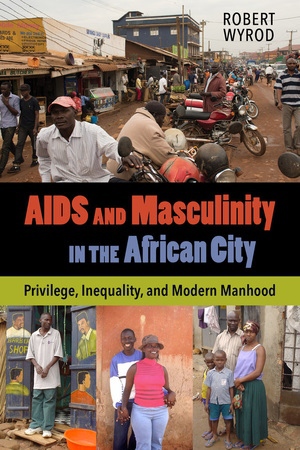 Wyrod, Robert 2016. AIDS and Masculinity in the African City. Privilege, Inequality, and Modern Manhood. University of California Press. 312 pp. Pb: $29.95. ISBN: 9780520286696.
Wyrod, Robert 2016. AIDS and Masculinity in the African City. Privilege, Inequality, and Modern Manhood. University of California Press. 312 pp. Pb: $29.95. ISBN: 9780520286696.
AIDS has been a devastating plague in much of sub-Saharan Africa, yet the long-term implications for gender and sexuality are just emerging. AIDS and Masculinity in the African City tackles this issue head on and examines how AIDS has altered the ways masculinity is lived in Uganda—a country known as Africa’s great AIDS success story. Based on a decade of ethnographic research in an urban slum community in the capital Kampala, this book reveals the persistence of masculine privilege in the age of AIDS and the implications such privilege has for combating AIDS across the African continent.
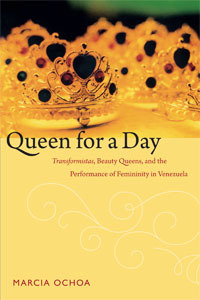 Ochoa, Marcia. 2014. Queen for a Day: Transformistas, Beauty Queens, and the Performance of Femininity in Venezuela. Durham: Duke University Press. 296 pp. Pb: $24.95. ISBN: 978-0-8223-5626-4.
Ochoa, Marcia. 2014. Queen for a Day: Transformistas, Beauty Queens, and the Performance of Femininity in Venezuela. Durham: Duke University Press. 296 pp. Pb: $24.95. ISBN: 978-0-8223-5626-4.
Queen for a Day connects the logic of Venezuelan modernity with the production of a national femininity. In this ethnography, Marcia Ochoa considers how femininities are produced, performed, and consumed in the mass-media spectacles of international beauty pageants, on the runways of the Miss Venezuela contest, on the well-traveled Caracas avenue where transgender women (transformistas) project themselves into the urban imaginary, and on the bodies of both transformistas and beauty pageant contestants (misses). Placing transformistas and misses in the same analytic frame enables Ochoa to delve deeply into complex questions of media and spectacle, gender and sexuality, race and class, and self-fashioning and identity in Venezuela.
 Oso, Laura and Ribas-Mateos, Natalia (eds.). 2013. The International Handbook on Gender, Migration and Transnationalism: Global and Development Perspectives. Edward Elgar Publishing. 512 pp. Pb: £36.00. ISBN: 978-1-78254-772-3.
Oso, Laura and Ribas-Mateos, Natalia (eds.). 2013. The International Handbook on Gender, Migration and Transnationalism: Global and Development Perspectives. Edward Elgar Publishing. 512 pp. Pb: £36.00. ISBN: 978-1-78254-772-3.
The International Handbook on Gender, Migration and Transnationalism represents a state-of-the-art review of the critical importance of the links between gender and migration in a globalizing world. It draws on original, largely field-based contributions by authors across a range of disciplinary provenances worldwide.
This unprecedented and ambitious Handbook addresses core debates on issues of gender, migration, transnationalism and development from a migration – development nexus. The volume explores the influence of global changes – and more specifically transnational migration flows – from the perspective of the articulation of production and reproduction chains. Particular attention is paid to so-called ‘global care chains’ with new analytical models developed around the emerging trends played out by women in contemporary mobility Dynamics.
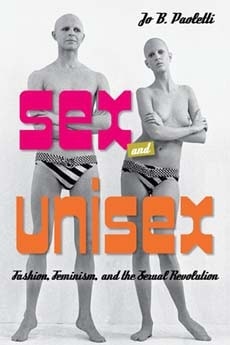 Paoletti, Jo B. 2015. Sex and Unisex: Fashion, Feminism, and the Sexual Revolution. Indiana: Indiana University Press. 216 pp. Cloth: $25.00. ISBN: 978-0-253-01596-9.
Paoletti, Jo B. 2015. Sex and Unisex: Fashion, Feminism, and the Sexual Revolution. Indiana: Indiana University Press. 216 pp. Cloth: $25.00. ISBN: 978-0-253-01596-9.
Notorious as much for its fashion as for its music, the 1960s and 1970s produced provocative fashion trends that reflected the rising wave of gender politics and the sexual revolution. In an era when gender stereotypes were questioned and dismantled, and when the feminist and gay rights movements were gaining momentum and a voice, the fashion industry responded in kind. Designers from Paris to Hollywood imagined a future of equality and androgyny. The unisex movement affected all ages, with adult fashions trickling down to school-aged children and clothing for infants. Between 1965 and 1975, girls and women began wearing pants to school; boys enjoyed a brief “peacock revolution,” sporting bold colors and patterns; and legal battles were fought over hair style and length. However, with the advent of Diane Von Furstenberg’s wrap dress and the launch of Victoria’s Secret, by the mid-1980s, unisex styles were nearly completely abandoned. Jo B. Paoletti traces the trajectory of unisex fashion against the backdrop of the popular issues of the day—from contraception access to girls’ participation in sports. Combing mass-market catalogs, newspaper and magazine articles, cartoons, and trade publications for signs of the fashion debates, Paoletti provides a multigenerational study of the “white space” between (or beyond) masculine and feminine.
 Reed, Kate. 2012. Gender and Genetics: Sociology of the Prenatal. London: Routledge. 198 pp. Pb: $46.95. ISBN: 978-1-13-882289-4.
Reed, Kate. 2012. Gender and Genetics: Sociology of the Prenatal. London: Routledge. 198 pp. Pb: $46.95. ISBN: 978-1-13-882289-4.
Prenatal screening for genetic disorders is becoming an increasingly widespread phenomenon across the globe. While studies have highlighted the importance of women’s experiences of such screening, little is known about men’s roles and direct involvement in this process. With a focus on the experiences of both women and men, this text offers an innovative and passionate account of the gendered nature of prenatal screening.
Drawing on interview data with pregnant women and their male partners in a UK city, Reed provides a compelling analysis of maternal and paternal roles in prenatal screening. Through this analysis, the book raises important issues around genetics, gender and screening practice. With a focus on the gendered production of ‘good’ and ‘bad’ genes, the book explores differences between visual technologies and blood screening. It also explores the gendered nature of genetic responsibility and the impact this has on parenting roles.
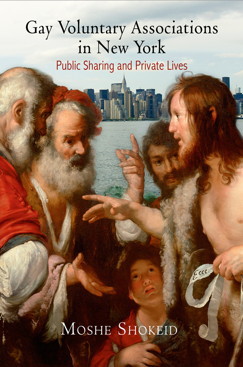 Shokeid, Moshe. 2014. Gay Voluntary Associations in New York: Public Sharing and Private Lives. Philadelphia: University of Pennsylvania Press. 240 pp. Pb: $49.95. ISBN: 9780812246575.
Shokeid, Moshe. 2014. Gay Voluntary Associations in New York: Public Sharing and Private Lives. Philadelphia: University of Pennsylvania Press. 240 pp. Pb: $49.95. ISBN: 9780812246575.
Gay Voluntary Associations in New York is a sensitive and insightful ethnography of social groups that have gathered around common interests in an urban LGBT population from the time of the AIDS crisis to the present. Anthropologist Moshe Shokeid examines the social discourse of sex, love, friendship, and spiritual life in which these communities are passionately engaged.
Drawn from long-term anthropological research in New York City, Gay Voluntary Associations in New York uses participant observation to explore such diverse social associations and religious organizations as seniors groups, interracials, bisexuals, sexual compulsives, gay bears, and Catholic, Protestant, and Jewish gay congregations. As an outside observer—neither gay nor American-born—Shokeid examines the social discourse within these voluntary associations from a critical vantage point. In addition to the personal information and intimate expressions of empathy freely shared in the company of strangers at social gatherings, individual stories and experiences are woven into the narrative to illustrate the existential conditions and emotional template of gay life in the city. Shokeid’s nuanced portrait of the affective relationships within these groups offers deeper comprehension of the social dynamics and emotional realities of gay urban communities in the United States.
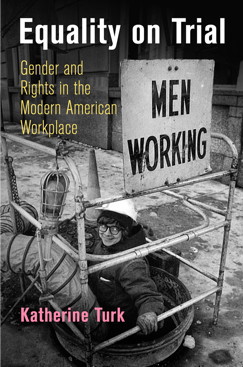 Turk, Katherine. 2016. Equality on Trial: Gender and Rights in the Modern American Workplace. University of Pennsylvania Press. 296 pp. Pb: $45.00. ISBN 978-0-8122-4820-3.
Turk, Katherine. 2016. Equality on Trial: Gender and Rights in the Modern American Workplace. University of Pennsylvania Press. 296 pp. Pb: $45.00. ISBN 978-0-8122-4820-3.
In 1964, as part of its landmark Civil Rights Act, Congress outlawed workplace discrimination on the basis of such personal attributes as sex, race, and religion. This provision, known as Title VII, laid a new legal foundation for women’s rights at work. Though President Kennedy and other lawmakers expressed high hopes for Title VII, early attempts to enforce it were inconsistent. In the absence of a consensus definition of sex equality in the law or society, Title VII’s practical meaning was far from certain.
The first history to foreground Title VII’s sex provision, Equality on Trial examines how the law’s initial promise inspired a generation of Americans to dispatch expansive notions of sex equality. Imagining new solidarities and building a broad class politics, these workers and activists engaged Title VII to generate a pivotal battle over the terms of democracy and the role of the state in all labor relationships. But the law’s ambiguity also allowed for narrow conceptions of sex equality to take hold. Conservatives found ways to bend Title VII’s possible meanings to their benefit, discovering that a narrow definition of sex equality allowed businesses to comply with the law without transforming basic workplace structures or ceding power to workers. These contests to fix the meaning of sex equality ultimately laid the legal and cultural foundation for the neoliberal work regimes that enabled some women to break the glass ceiling as employers lowered the floor for everyone else.
**********
Featured image by Kristofher Muñoz (flickr, CC BY 2.0)


